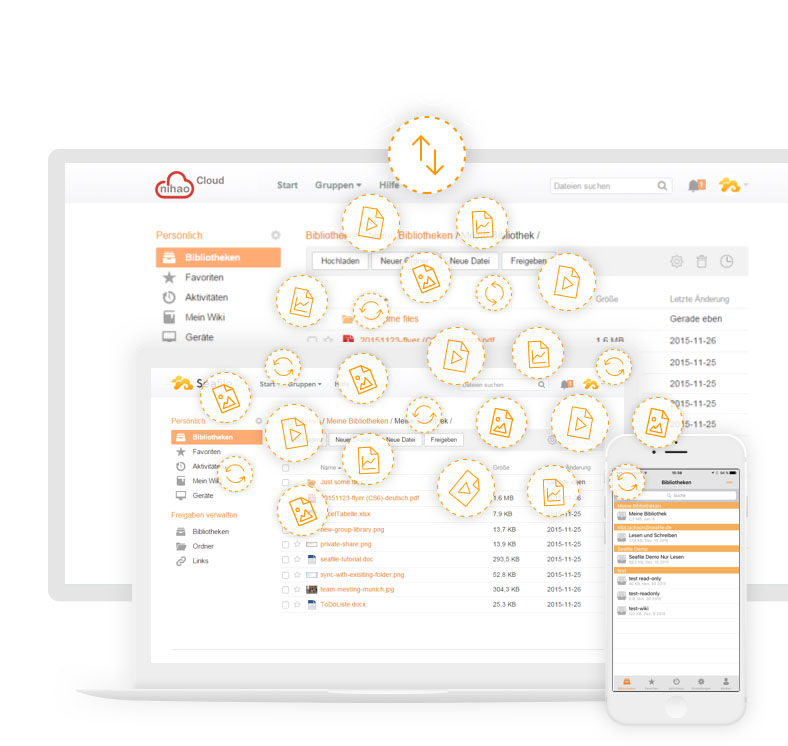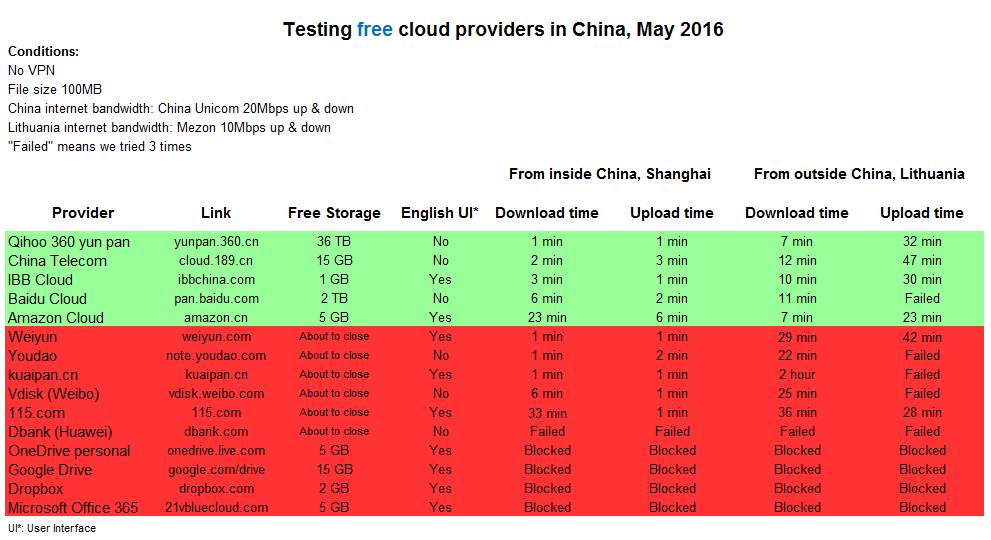Cloud Storage providers in China: speed test before the big crackdown in 2016
About two weeks ago Chinese public received striking news: most Chinese cloud providers “decided” to discontinue their Cloud Storage services. Major reasons would include government’s involvement regarding illegal content that is stored and shared among citizens, lack of profit from free plans and enormous costs for bandwidth, storage resources, and maintenance.


This article is not about “why did it happen”, but rather: “What can we do now”? Right before most Chinese Cloud providers close their doors, we decided to take a look and test which of them are worth giving a shot for personal or business Cloud storage use.
In the research, we were particularly interested in which ones could upload and download the fastest, not only inside China but also from outside of the GFW – the Great Firewall of China. We tested the most popular Cloud Providers, both Chinese and foreign alternatives.
First, how did we do the test? Simple, we subscribed to almost ALL cloud storage providers we could find and accessed without using a VPN. Foreign providers like Dropbox, Google Drive, or even Microsoft Office 365 OneDrive were not accessible without a VPN, therefore, we listed them as blocked.
We took the same 100 MB zip file and tried to upload/download it in China and then upload/download it in Europe, using the same computers and the same Internet connection to have equal testing conditions and environment. Here is the list with all Cloud Storages speed test results.


See whats next for the Public Sector and Business Sector:
Public Sector
Since the majority of Chinese Cloud providers will be closed by July 30th, 2016, we will be left with only three main giants: Baidu pan, Qihoo 360 and China Telecom Cloud. So first let’s see how they performed among each other.
The first position is occupied by the famous Qihoo 360, with more than 500 million active users of its antivirus software and secure web browser and 67.48 million Yunpan cloud storage users. It offers humongous free 36 TB. Upload and download time in China rounded nearly 1 minute. Outside of China, our archive arrived in the first place with impressive 7 minutes download and 32 minutes upload speed. User interface only available in Chinese though…

Baidu pan has the most users – 383.42 million – and that could maybe explain why it is so freakishly slow both in China and abroad. Even though it gives free 2 TB of space, the download speed in China was 6 minutes where most providers would deliver in under 1 minute, upload was not too bad, but still a whole minute behind others. When it came to downloading from Europe, we were expecting worse results, but 11 minutes were not too bad, whereas upload failed three times in a row.
China Telecom Cloud 天翼云 or otherwise named cloud.189.com took 3 minutes to upload and 2min to download in China. A bit better than Baidu pan, but still behind Qihoo 360. Outside of China the download took 12min and upload 47 long minutes. It is worth mentioning that China Telecom is a state-owned company- whatever it may mean in terms of security…
We have also tried Amazon Cloud Drive where you can get 5 GB of space and English interface. We were surprised by download and upload speed, assuming, that the server might not be located in China, but rather somewhere outside of China. Download speed in China was whole 23 minutes and upload 6 minutes. Abroad it downloaded in 7 minutes as if the server was next door, but to upload back to China took another 23 minutes. You should also take into account that you can only store files on Amazon cloud drive and the option to automatically sync to your desktop is not available.
As for those providers that are going to close down or turn off sharing features, the only one that would deserve a proper burial should be Tencent’s Weiyun, which offers 1 TB for free and has English interface. Actually, within China, its download speed was 20 seconds faster than Qihoo and upload 9 seconds faster. Outside of China Weiyun didn’t perform as fast as within China: download was 29 minutes and upload took whole 42 minutes.

tencents weiyun desktop aplication
As for those providers that are going to close down or turn off sharing features, the only one that would deserve a proper burial should be Tencent’s Weiyun, which offers 1 TB for free and has English interface. Actually, within China, its download speed was 20 seconds faster than Qihoo and upload 9 seconds faster. Outside of China Weiyun didn’t perform as fast as within China: download was 29 minutes and upload took whole 42 minutes.
Another competitor worth mentioning is 115.com from Dongguan. We were impressed by the very beautiful web interface and phone app. Very user-friendly, and even though it is in Chinese, it was very easy to navigate. In China upload speed took competitive one minute, but download speed was painful and long 21 minutes in the web browser and 33 minutes from the phone app. Outside of China download speed was 36 minutes and upload 28 minutes, which is quite decent compared to others.
At the moment, speed-wise Qihoo 360 would be the only viable solution for personal use between China and abroad. We hope that when those 237 million users have to shift from closed services to either Baidu or Qihoo, the overall bandwidth would not suffer and speed wouldn’t become unbearable. Since the main goal here seems to be to have fewer Cloud Storages to monitor “illegal” activities like keeping and sharing pornography, it is highly unlikely that any new Cloud solutions will enter the market for the common public.
Business Sector


As for Chinese companies, they will most likely stick with Baidu pan or Qihoo 360 for internal file sharing and storage. But what about foreign companies that need to connect to their International branches? In full article 3 best IT practices to connect offices in China we discussed in detail about all the ways that big enterprises and smaller SMEs connect their businesses to China.
With bigger ones it is fairly simple, they use expensive MPLS lines, that connect directly to their HQ abroad, but it gets trickier with smaller businesses that cannot afford 10.000 RMB per month or above for these lines .Most German and EU companies either use solutions that are under the radar from the public, only used by businesses and don’t receive much buzz in public, or common Microsoft Office 365 provided by Chinese partner 21vianet.
NiHao Cloud
IBB Cloud or now (NiHao Cloud ) from a Beijing and Shanghai-based Sino-German ICT company come third on the list. Their cloud file sharing service uses the secure and reliable Seafile technology, and they seem to operate their servers in Asia-Pacific region, while having a special connection to China, and thus performing nearly as good as Qihoo or Wei Yun: In China, the download time was three minutes, and the upload speed was identical to Qihoo – only one minute. The download time abroad was again a couple of minutes longer than Qihoo, but the upload time was two minutes faster.

NiHao Cloud Apps and Web Software

A cool fact about NiHao Cloud is its integrated encryption: Companies using the service can have all their files encrypted on their side, so not even the company that stores the data can read it. This feature is often used by EU or German companies, which are sometimes concerned about the security and confidentiality of Chinese Cloud storage solutions and want to make sure there will be no Intellectual Property leakage from the IT side. All libraries are synced with PCs and can be assigned to specific groups like Finance or HR and accessed with a password.
So even though its download speed may not be the best, it syncs document by document in the background automatically, and you don’t need to download files later: Just open them like any other files in your computer.

Additionally, documents can be locked while working on them, so no one else with an access to the shared folder can edit it at that moment. Later on, you can even review the history of every change that was made on the file. The only downside to this solution is that it is not available for public use and even if it was, it does not operate on a freemium business model like Qihoo 360 or Baidu pan.
You can try a free version that gives you up to 2GB free space and allows you to share files to anyone in the word.
One Drive
Surprisingly, Office 365 OneDrive recently became blocked by the GFW, even though it is operated by a local Chinese partner 21vianet. It was possible to drop files to OneDrive client app and have it synced, but the web access was not accessible without VPN. It seems that only a few companies are chosen to provide Cloud services in China in order to better “manage all the illegal content” on the cloud.
Summary
China is always changing and adapting to the newest technologies, but still keeping its “traditions” to maintain order in its own style also on the Internet. Therefore, if you would like to upload fast and easy a couple TB’s of selfies (with clothes) or other nonsensitive data on theoretically public Chinese Cloud providers, it’s no big deal, it is fast and it is free, for now.
As for businesses, we would recommend looking for foreign Cloud providers with cross border China connections, which are usually much smaller, less known and focus on the international business environment only.
Update: China’s Public Cloud Crackdown is not Over. Update 2017

